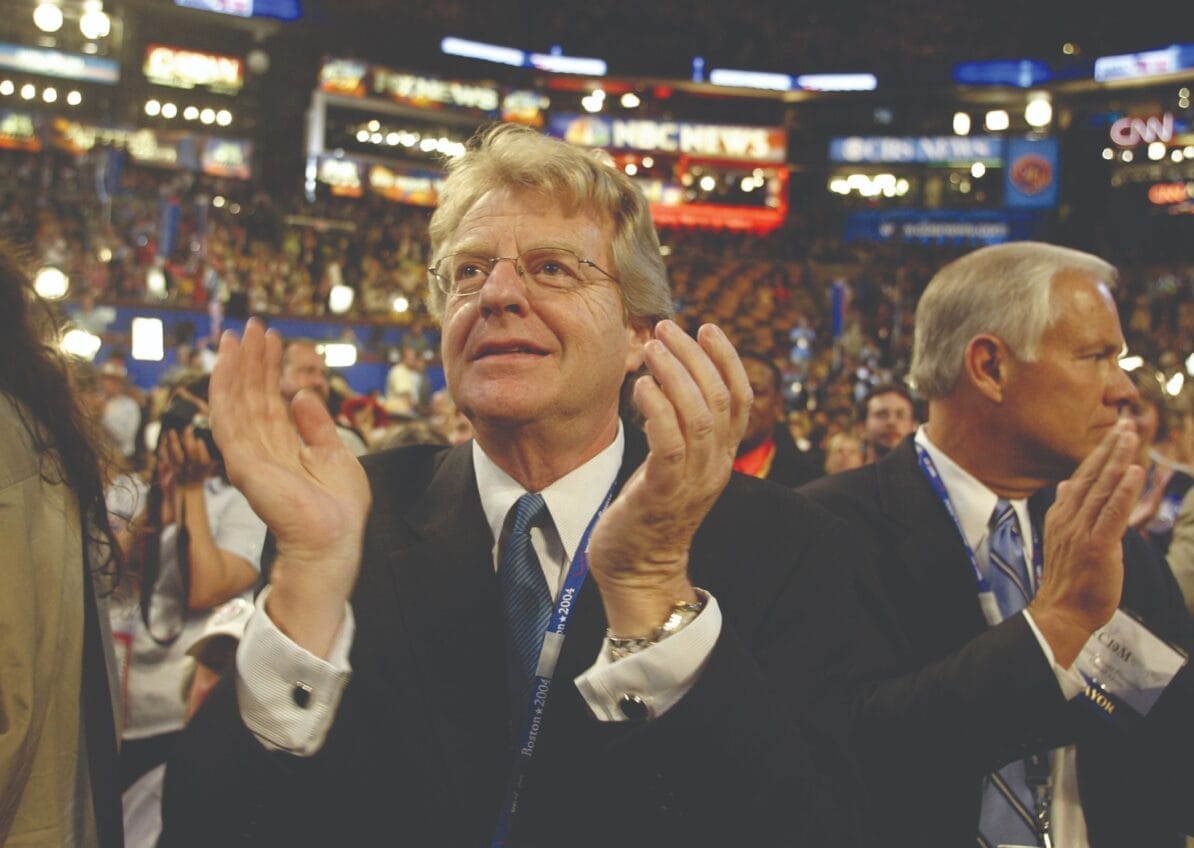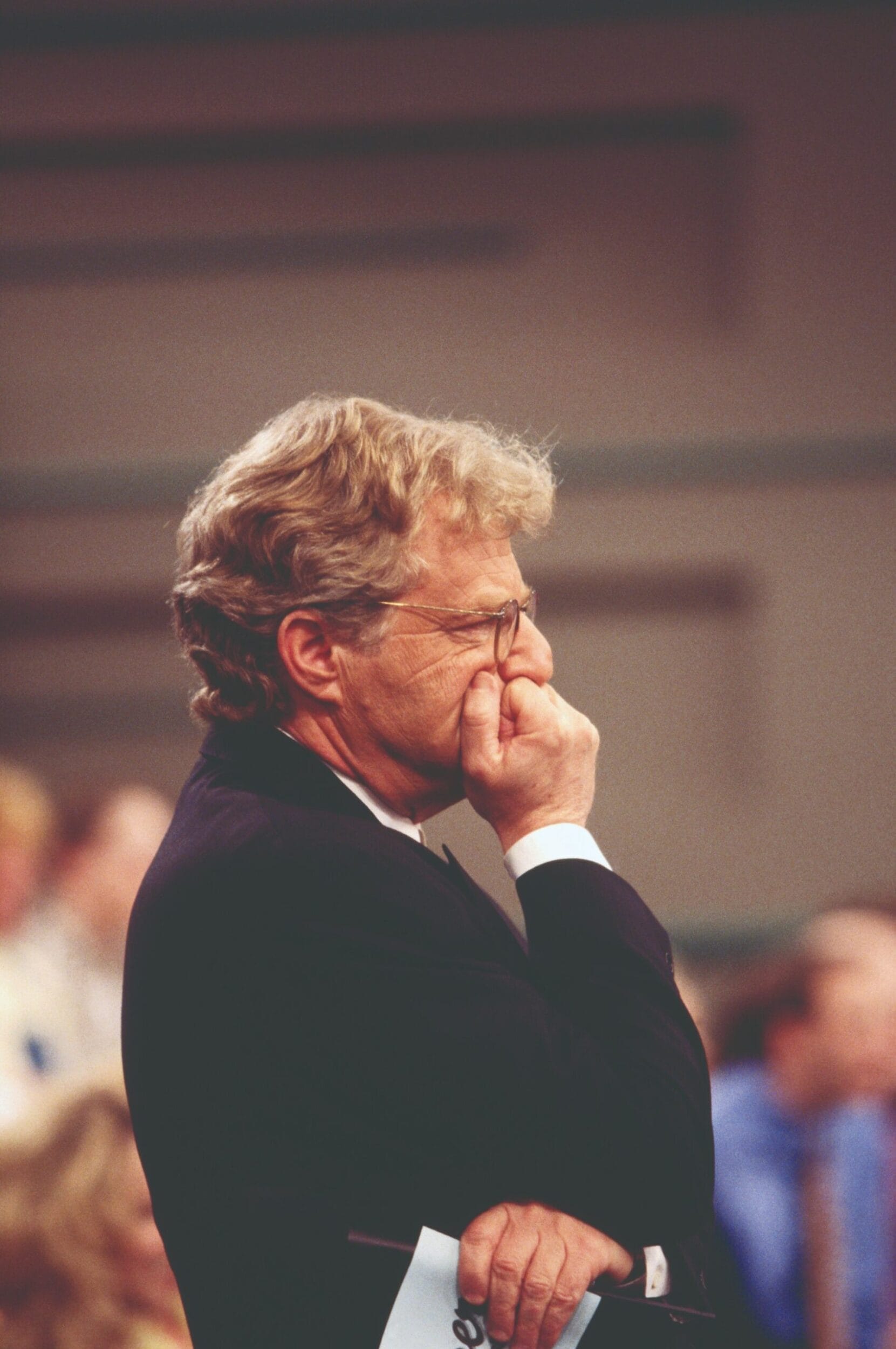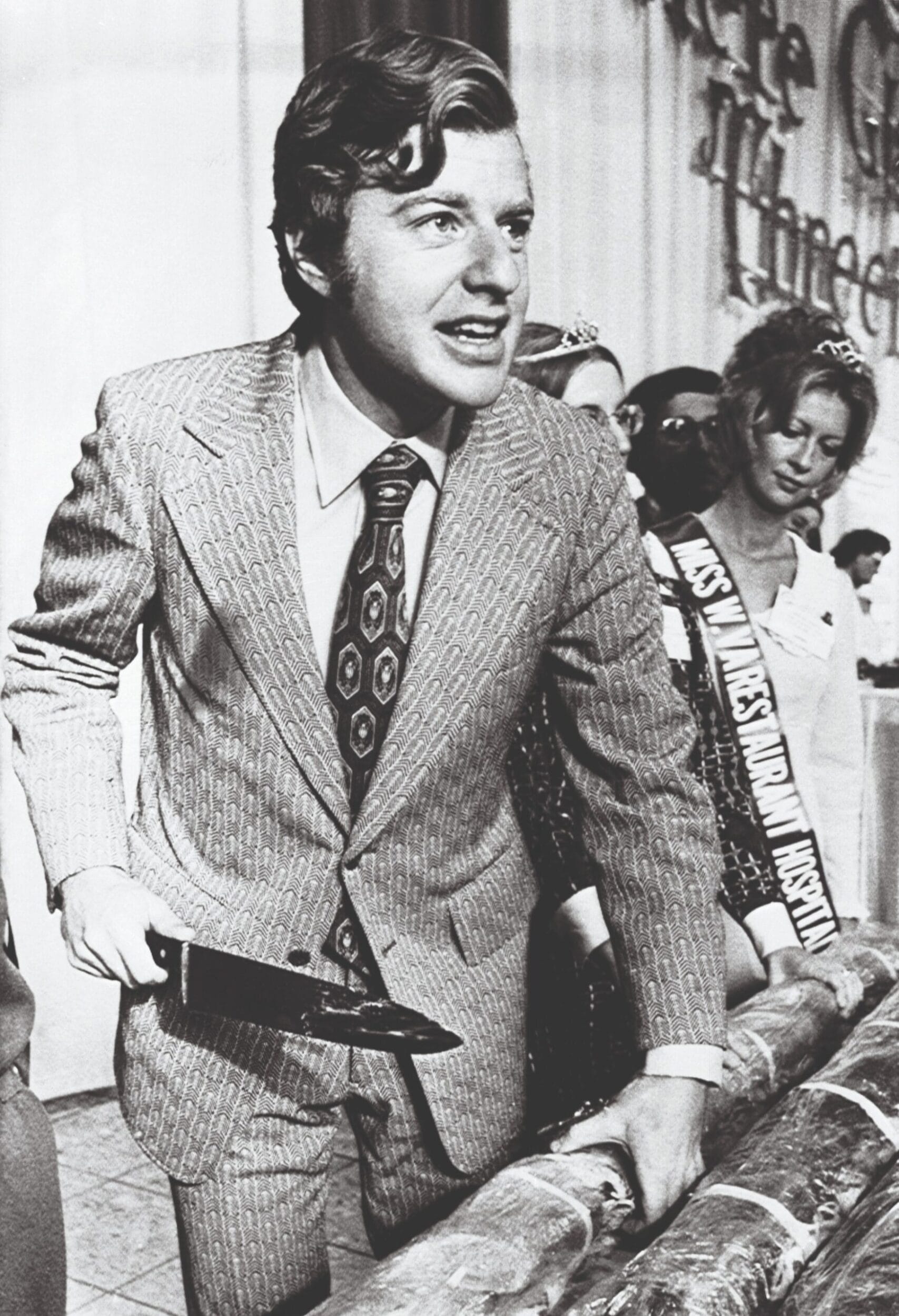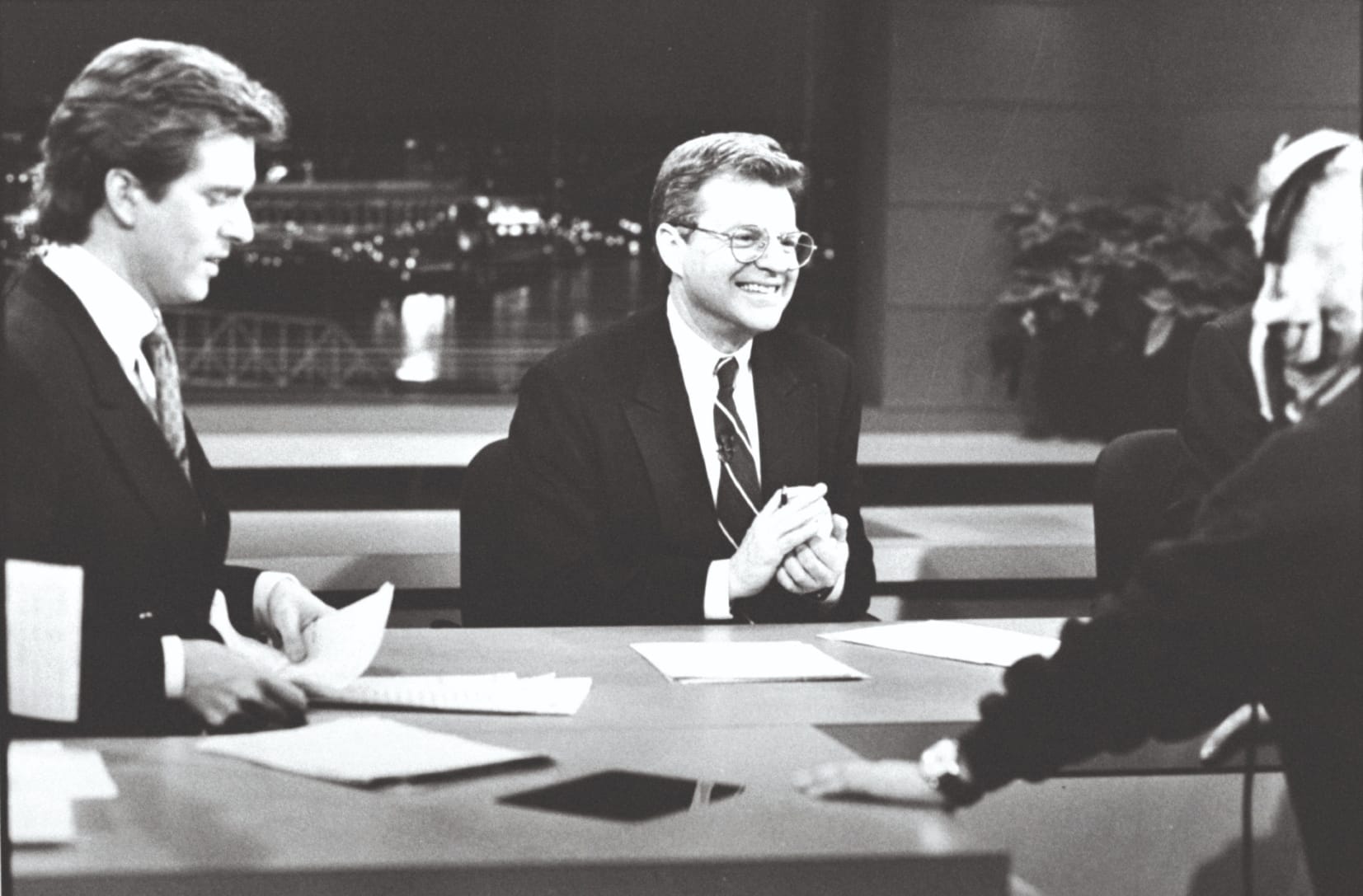Becoming Jerry Springer
Following the death of Jerry Springer on 27th April 2023, coverage of his life focused on the legacy of his infamous chat show. But what led him to become the self-declared ringmaster in a circus of human dysfunction? And what happened to his dreams of political greatness?

Jerry Springer applauds speakers during the 2004 Democratic National Convention. Despite his belief that he could be “Donald Trump without the racism” he couldn’t be persuaded to run for political office again. Photo: Scott Olson/Getty Images
27th April 2023 (Taken from: #51)
“I’m Jerry Springer and I want to be your governor. After sharing some specific solutions for our unemployment and education problems in the state it looks like the nomination is finally within grasp, which makes what I am about to tell you more difficult.
So, nine years ago I spent time with a woman I shouldn’t have. And I paid her with a cheque. I wish I hadn’t done that. And the truth is I wish no one would ever know. But in the rough world of politics, opponents are not about to let personal embarrassments lay to rest. Perhaps, like you, I’m not sure what any of this has to do with being governor. But maybe my talking to you about this makes a point.
Ohio is in a world of hurt. The next governor is going to have to take some heavy risks and take some hard truths. I’m prepared to do that. This commercial should be proof I’m not afraid of the truth, even if it hurts. Come on, join me on June 8th. We’re going to turn this state around.”
Democratic party primary campaign advert for Ohio governor, 1982.
When Tim Burke remembers Jerry Springer, he doesn’t think of the man who hosted what he calls “the crazy show”. Nor the tabloid provocateur who for many was the lurid avatar of America’s fin de siècle societal decline. No, Burke recalls a young, ambitious activist with an unmistakable touch of showmanship who became a rising political star in the Democratic party in the 1970s. And the time he broke into prison.
“We had a century-old jail here in Cincinnati that was a piece of crap, and falling apart,” recalls Burke, a lawyer, former Democratic party chair for Hamilton County – one of Ohio’s most populous areas – and lifelong friend of Jerry Springer. “Without telling anybody he spent a night in the jail to experience what it was really like. The next morning after he got out he held a big press conference to call attention to how terrible it was. It was all over the news.”
It is almost three months to the day since Springer died of pancreatic cancer and Burke is sitting in the office of his Cincinnati law firm. The death of the host of The Jerry Springer Show, one of the world’s biggest and most controversial programmes of the 1990s, was a global news event. Springer’s obituaries all had a hand-wringing quality to them, concluding that his show was harmful to US society and that it had helped lead the world down a damaging path. But in Cincinnati, Ohio, he is remembered very differently. Long before he became Jerry Springer, he was Gerald N Springer, an idealistic but effective politician with a rare ability to appeal across the political divide – and a taste for political theatre. “That jail,” said Burke, “got torn down.”

Jerry Springer pauses to listen to his guests during the taping of an episode of The Jerry Springer Show. Photo: Ralf-Finn Hestoft/CORBIS/Corbis via Getty Images
Gerald Norman Springer was born in Highgate tube station in London in 1944, during an air raid. His parents were German Jews who had fled Berlin for the UK months before the start of the Second World War. Both his grandmothers perished in Nazi death camps. The rest of the Springer family – his parents and one sister – emigrated to New York in 1949, sailing on the Queen Mary, a moment he recalls in his autobiography Ringmaster. “It was the absolute silence I remember as the ship passed the Statue of Liberty,” he wrote, recalling how he stood on the deck with his mother.
He had an incredible amount of charisma… Jerry Springer could tell a story”
His family built a successful toy business and Springer enjoyed a solidly middle class upbringing, going to college and moving to Cincinnati in 1969 to start his law career. Springer, who had already worked on Bobby Kennedy’s ill-fated 1968 presidential election campaign, threw himself into the politics of the day. He was part of the anti-Vietnam War movement and at 25 spearheaded an attempt to lower the voting age in Ohio from 21 to 19 while at the same time running for Congress in Ohio’s 2nd Congressional District. “I started out working with Jerry about 55 years ago, on the voting rights issues when I was still a college student, and Jerry was a baby attorney,” recalled Burke. “It was the Vietnam era. The height of the civil rights movement. It was young people saying: ‘Hey, if you’re going to send us to south-east Asia to fight in a war, shouldn’t we at least have the right to vote?’ Jerry got a lot of attention. He could walk into a Veterans of Foreign Wars hall and tell them he was against the Vietnam War. And they wouldn’t throw him out. They’d listen to him.”
The voting age change was narrowly lost, as was the congressional race, but both were closer than predicted in what was then a deeply conservative state. “As a very young, first-time candidate, he had an incredible amount of charisma, a great deal of humour, that he could bring to anything,” said Burke. “Jerry Springer could tell a story.”
A year later, in 1971, Springer ran for city council and won, a victory that gave Democrats control of Cincinnati for the first time in decades. “The Democratic party was extremely excited about him and in just a couple of years he was in line to become the mayor of Cincinnati,” said Burke. “And that’s when he got in trouble with a prostitute.”
The FBI raided a well-known brothel and later traced back two personal cheques signed by a ‘Gerald Springer’. The Cincinnati Enquirer splashed the story in May 1974: “Cincinnati City Councilman Gerald N. Springer, who resigned Monday amid reports of a vice investigation, admitted Tuesday he had engaged in activities ‘which, at least to me, are questionable’.”
A politician resigning because of a sex scandal in buttoned up middle America isn’t exactly a shock. But what Gerald Springer did next laid the foundations for what Jerry Springer would become. He called a press conference. Hundreds of people, including Burke, were there. “He just laid out all of the facts and confessed. He had already resigned!” said Burke. “And his confessional press conference prompted a large move among the citizenry of Cincinnati, including some Catholic nuns, to urge city council to reject his resignation. Now, in the end, his resignation went forward. But that was the start of his comeback.”
Liberal Jerry delivering to conservative Cincinnati worked”
Within a year he had been re-elected to city council. In 1977 he was appointed Cincinnati’s mayor. And in 1982 he ran in the Democratic primary for the Ohio governorship. Knowing that his opponents would use the prostitute scandal against him, he ran TV adverts that addressed it head on. It was a modest production, Springer in suit, tie and glasses, on a stool, looking straight at the camera and admitting he had done wrong. According to Burke, many within the Democratic Party thought his open admission was political suicide. And, indeed, he lost the primary. Shortly afterwards he would leave politics to begin the second act of his career. But in that advert Gerald N Springer had transformed into Jerry Springer. He had also learned an important lesson. The down-the-camera confessional connected with the audience. And perhaps even absolved you of sin.

Jerry Springer cutting a large sandwich during a convention of restaurant operators in February 1974. He would go on to become mayor of Cincinnati in 1977. Photo: Bettmann /Getty Images
John London had covered Gerald Springer’s political career as a rookie radio journalist. “It was an evening townhall in conservative Westwood, and the issue was Section 8 housing,” he recalled of one of the first times they met, back in the mid ’70s when Springer was still a councilman. Section 8 housing is a policy that gives rent assistance to low-income families. “They [the residents of Westwood] were very much against, and Jerry was very much for. As soon as he walked in [there was] a chorus of boos throughout the whole place. He spoke only for about five minutes. When he left the podium, he got applause and cheers. I hadn’t seen anything like that. I thought, ‘never underestimate this guy’.”
As a politician Jerry Springer gave great soundbites and made great copy. But it was still a surprise that, after his run for Ohio governor failed in 1982, he was approached by WLWT Channel 5, one of Cincinnati’s biggest TV news stations, to work for them, not as a commentator or analyst, but as a news anchor, a career Springer had never considered before. London had also joined the station as a news reporter, which then had the lowest viewership of Cincinnati’s four TV stations, and would be Springer’s colleague for the next decade. Springer quickly helped turn the station’s fortunes around, and within a few years it had the best ratings of any news channel in the state. This was partly down to ‘Jerry Springer’s Commentary’, a monologue at the end of every news broadcast that gave some moral philosophy on the day’s events. Each commentary would end with the words: “Take care of yourself, and each other.”
“Walter Bartlett [the owner of the channel] didn’t know how this was going to turn out,” says London. But the bet worked. “As incongruous as it might sound, liberal Jerry delivering to conservative Cincinnati worked.”
Perhaps the biggest surprise was how he adapted to his life as a newsman. One story, London recalled, saw Springer live on the streets for a week to highlight Cincinnati’s homelessness problem. “We thought, ‘you know, that’s true journalism’.”
The story earned Springer one of ten regional Emmys. He was known as a thoughtful, humane ex-mayor and an adopted son of Cincinnati. And then his network suggested a new opportunity. Springer later told the story that being a talk show host wasn’t something he actively sought out. WLWT wanted a talk show to replace The Phil Donahue Show, which had been running since the 1960s, and told Springer to front it. In his telling, he was simply a soldier sent on deployment, following orders. He complied.
The Jerry Springer Show started in 1991. Springer, who was juggling both the show and his job as a news anchor, initially wanted it to be highbrow. Political. To deal with weighty issues. The first episode was a family reunion. One episode: ‘Who is Jesse Jackson?’ was a nod to Springer’s advocacy during the civil rights movement. Another episode, ‘Oliver North: An American Hero’ dealt with the Iran-Contra affair.
The show was not a success at first. Viewing figures were low and The Jerry Springer Show looked like it might be cancelled. But then a new executive producer was hired who would revamp the show and take it down a totally different, more downmarket path. Now the episode titles sounded very different: ‘I’m a Breeder for the Klan’, ‘I Cut Off My Manhood’, ‘Jerry Rescues a 1,200 Pound Couple’…
Going low worked. In four years The Jerry Springer Show went from near cancellation to being syndicated nationally and then becoming the most watched TV programme in America. It briefly overtook Oprah Winfrey’s eponymous show, which had held the top spot for over a decade.

Jerry Springer chatting with co-anchor Jim Watkins and a technician before a news broadcast at WLWT-TV, 15th December 1992. Photo: Steve Kagan/Getty Images
London remained at WLWT as Springer became the ringmaster of a show known across the world. “I remember Jerry saying, ‘You know, I’ve got to do this for a little while, but then I’ll be able to get [former governor of New York] Mario Cuomo, and we’ll serious up’,” said London. “But of course there was no going back.”
It was only when the photos arrived of a man performing a sex act on a female pony that Melinda Chait Mele believed she had a story worthy of the show. It was the spring of 1998 and Mele had been working as a lead producer for The Jerry Springer Show for less than a year. The pressure to find ever more outrageous stories was relentless but she thrived in the hothouse atmosphere, in part because of her background in tabloid journalism. Prior to moving to television, she had worked at the National Enquirer, probably the most notoriously salacious tabloid publication in the US.
The show had received a tip on its hotline after asking “Do You Have a Bizarre or Unusual Lifestyle Your Family Disapproves of?” A man called Mark Matthews from Joplin, Missouri called in about his love for his wife Pixel. Pixel was a pony. The producers were sceptical, until the photos arrived and Mele went to interview him. “It was quite disturbing,” Mele recalled. “He lived in a trailer home and it had ramps in and out. I was in the living room and he brought Pixel and she just immediately peed on the floor. I mean, a horse peeing is not a chihuahua, you know? He was kind of embarrassed. But at the same time, he was sort of like, ‘Well, this is kind of how it is’.” Matthews had married Pixel in a wedding ceremony – although finding someone to officiate had been hard work. “The ceremony was kind of this satanic thing,” says Mele. “He [Matthews] was not satanic, and neither was Pixel. But the only way that he could actually have a ceremony that he felt was kind of legit, was to go to these people who were Satanists.”
Convinced she had a ratings winner on her hands, Mele returned to Chicago and set up the show. The crowd, and the host, didn’t know what was about to happen. Springer, Mele explains, would only be briefed about each episode moments before the taping began, and was often handed his cue cards just as he stepped onto the set. His look of bemusement when Pixel was brought out, and Mark Matthews began to kiss her, was genuine. “I feel sick,” said Springer, who seemed to stagger as he sat down on a step in the crowd. Later on a man and a woman were interviewed about being in sexual relationships with their pet dogs.
It was clear that there was a direct line from Springer’s confessional Democratic Party campaign videos, through his post-news commentaries and on to his Final Thought, arguably one of the most memorable parts of the whole Jerry Springer Show; a postscript homily in which he tried to make sense of, and perhaps atone for, the craziness the viewer had just witnessed. Rewatching them now, they feel like part moral lecture, part mea culpa. What began as a quaint talk show, with a calm, serious politico as host, had degenerated into a circus of sex, violence, race wars, fetish and horror. The show’s excess was now what Jerry Springer would always be known for. And that had consequences.
His show really was just a zoo. And there was never a good outcome”
The show caused something of a moral panic in America. Politicians and religious figures called for it to be axed. TV Guide called it the “worst TV show of all time.” Rival broadcast executives said it made them ashamed to be in the same profession. And of all the 4,969 episodes of The Jerry Springer Show that were made, ‘I Married a Horse’ was perhaps the programme’s apex – or nadir, depending on where you stood. Senator Joe Lieberman and former US education secretary William Bennett wrote to USA Network, then the show’s parent company, expressing outrage that an episode would run featuring “three guests who regularly engage in bestiality (sexual relations with animals). The decision to broadcast this repugnant segment for any adult, adolescent, or toddler to see is reprehensible, and sends a disturbing message to America’s families about the lengths that the TV industry will go to make an extra dollar.” Every affiliate channel refused to run it, effectively banning the episode, although Mele says that it did air in several cities accidentally. “I’m still really proud of that show,” she says.
One of the biggest criticisms of The Jerry Springer Show was that it exploited the misery of some of society’s most vulnerable people. “They wanted to be on the show,” Mele says of the guests she found, although she conceded that appearing on the show rarely improved the lives of the people who featured. “They thought that Jerry Springer would make it all better. He would change their life. They wanted to be able to come, get out their anger, in front of Jerry, and they wanted him to take their side. And they wanted to feel validated. And it’s interesting, because his show really was just a zoo. And there was never a good outcome.”
Mele wasn’t there for long. After a season and a half of working in what she called “a toxic environment” – an atmosphere she attributed to other producers on the show rather than to Springer – she moved on. She says the show negatively affected her career and she struggled for work afterwards, but was still pleased to have had the experience. “I have no regrets, I had some of the funnest times working ever,” she says. “There was not anybody that I ever brought to Chicago for that show that didn’t want to be there.” She pauses to think about that for a beat. “Well, actually, there was one, and he left in the middle of the night,” she continues. “But he was a 53-year-old guy who was living with a 14-year-old prostitute.”
The show, she believes, did change American television and American society. And Springer was at the centre of it, even if he would often distance himself from his own product. He would call the show “stupid” while at the same time calling criticism of it “elitist”. He would say he never watched it. Once he claimed it was all an act. “I play a crazy talk show host, but that’s not me. It’s like an actor playing a role.” Mele, though, doesn’t subscribe to that analysis. “You can’t really separate him from the show because it was a perfect amalgamation of him,” she says. “It really was his personality, that calm, self-deprecating, smart, approachable person that made that show work. It wouldn’t have worked with somebody who had a more scandalous outer shell.”
But the show’s excess was now what Jerry Springer would always be known for. Even as The Jerry Springer Show chased the ratings with ever more extreme stories, Springer still harboured political ambitions. He explored runs for one of Ohio’s senate seats in 2000 and 2004, with Tim Burke, the then-chair of Hamilton County Democratic party backing both his prospective campaigns. But he always felt the “crazy show” was too big a barrier to overcome.
Burke was one of the few in his party that continued to back Springer’s political ambition. Other Ohio Democrats were appalled, believing that his show tore at the fabric of American society, giving Republicans all the ammunition they needed to destroy his candidacy. Ultimately Springer decided against running both times. “It is impossible to run for office while the show is still on the air,” he conceded to CNN in the build-up to the 2004 election.
But then, 13 years later, Donald Trump was elected president. The Jerry Springer Show was still running and a reality TV star was in the White House. The scandals that had sunk politicians in the past didn’t seem to matter anymore. Confessing to writing personal cheques in a brothel, or hosting a show that featured a man openly kissing a pony didn’t seem that bad compared to paying off an adult film star lover before a presidential election, or publicly urging Russia to hack Hillary Clinton’s personal emails.
If there was ever a time for Springer to run for the political office he craved – as a self-declared “populist liberal progressive” whose name recognition as a talk show host was now seen as an asset – it was in the post-scandal age he helped to build. “His [Trump’s] constituency is basically mine. These are fans of the show,” Springer told the Cincinnati Enquirer, when he explored joining the 2018 race for Ohio governor. “I could be Trump without the racism,” he said. He could never be president like Trump, of course. Being born in the UK meant he was constitutionally barred, but Burke could see that this was Springer’s moment. “I think he would have had a damn good chance of winning,” he says of the 2018 governor’s race. “We tried to talk him into it, and a US Senate race. But in the end we could never get him to do it.”
The Jerry Springer Show ended in 2018 after a 27-year run. Springer spent his last years presenting a podcast, travelling and giving lectures about his time on the show. Although his political ambitions dimmed, he continued to campaign for Democratic candidates in Ohio and was Hamilton County’s biggest Democratic donor up until his death. He had achieved fame, infamy even, and a vast fortune. But there was always the feeling of what might have been. “There were those who would get so upset with Jerry because they accused him of wasting his talent on that stupid show,” says Burke, although he doesn’t agree. Springer, he believes, should have been proud of his legacy and the honest way he approached everything, from the state of Cincinnati jails to his own transgressions. “He opened up and told the damn truth, as crazy as it was.”
Slow Journalism in your inbox, plus infographics, offers and more: sign up for the free DG newsletter. Sign me up
Thanks for signing up.








